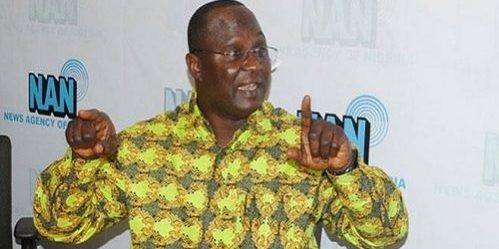“One tool for informed decision making which can guarantee meaningful resource allocation is data and its more analytical form, statistics. Our leaders over the years have fostered a culture that does not place value on data, statistics and the superior decision making that can flow from it.”
Leaders should be both teachers and learners. As teachers, it is expected that they come to office with a fair body of knowledge of the problems of those they aspire to govern. Yet they must be modest and humble enough to learn from and be schooled by the scope of their responsibilities. The principal tool for both approaches to leadership and governance is data furnished by reliable statistics. To embark on governance without adequate data is like a pilot embarking on a flight without a flight plan.
In advanced democracies, most of those who aspire to lead spend time gathering data, researching, developing policies, plans and programmes to confront the most pressing challenges of their society. They are further aided by Think-Tanks and seasoned policy advisers. It is understood that the leader does not and cannot know it all. In our clime however, leaders come without a deliberate and clear vision. They are hardly willing to engage with citizens or open the door for ideas exchange. For us, leadership appears to be a fiefdom with benevolent fiefs, if we are lucky, and impoverished serfs, grateful for any morsel that falls off the master’s table. Not having been guided by reliable data of painstaking research, leadership in our clime is by happenstance with our leaders figuring it out as they go along all the while posturing as all knowing and all powerful. The result is that policies are jaded, shallow and hardly yield sustainable results.
One tool for informed decision making which can guarantee meaningful resource allocation is data and its more analytical form, statistics. Our leaders over the years have fostered a culture that does not place value on data, statistics and the superior decision making that can flow from it. Ross the world policy initiatives are driven by data and statistical projection, and future planning hangs heavily on them. In Nigeria, some of the many problems confronting us today could have been mitigated if previous political leaders had made appropriate use of data and statistics for decision making. Such challenges as youth unemployment, our poor healthcare system, the power sector crisis, inadequate housing, inadequate provision of water, poor sanitation and a hugely challenged education sector, amongst others can only be satisfactorily resolved with adequate data collection and analysis. It is unfortunate and regrettable that we do not even know in truth how many we are. How then can we talk about any serious planning by government?
There is more bad news. Even when we try to collate some manageable data it hardly forms the basis for our planning or decision making. For instance, unemployment rate has been on the incline for several years. By December 2018, with unemployment standing at 23.10% according to statistics from Nigeria Bureau of Statistics (NBS) we were among top 10 countries in unemployment ranking even though different countries use different methods to calculate unemployment. More frightening is the number of young people aged between 15 and 24 who are either unemployed or underemployed which NBS gave as 68.7% as at third quarter of 2018. The combined unemployment rate for the age group 25-34 years stood at 45.1% by December 2018. The age group 15-34 represents the youth population in Nigeria and has a combined unemployment and underemployment rate at 55.4% or 24.5 million. When this is juxtaposed with increasing inflow of new entrants into the labour market you will appreciate the fact that these are not just numbers but a time bomb. The situation has not improved two years after, and is most likely going to be worse by the end of 2020 with the global pandemic. So the numbers will continue to rise. Herein lies my worry. Governments across the three tiers do not appear to have any concrete plans based on statistical projection to create or generate employment for these young people today. The little being done at the federal level may disappear into a whirl pool if not supported by the state and local governments because tokenism can hardly yield long term results.
Like unemployment, the challenge confronting us in power sector today did not happen overnight. It is a product of many decades of negligence and refusal to use data and statistical projection to plan. Power demand projections depend on demographics and economic growth patterns. Despite having one of the world’s largest deposit of coal, massive oil and gas reserves and plenty of sunlight, which would have guaranteed us the right energy mix, at least 60% of our population is not connected to power. Those who are linked to national power grid spend more time in darkness or epileptic power supply, partially because of a transmission network built several years ago that did not take into account population growth. The challenge is made more complex by the fact that we do not still have accurate and reliable data of power consumption and statistical projection of future power needs so our plans are suspect .
A similar scenario can be seen in healthcare where it took Covid-19 for us to come to terms with how dysfunctional our healthcare sector is. Today we can only lay hands on 2004 and 2011, Health Facilities Survey with very limited data to work with. We have seen widening gaps in our health care system. Poor health outcomes persist despite increase in expenditure and budgets annually. The real problem is paucity of data and lack of its usage. (where they exist) in planning. Government’s health intervention is not driven by data but by political expediency.
READ ALSO: COVID-19: Peterside Urges Rivers Gov’t To Establish More Testing Centres
This is the same pattern in the education sector, water, agriculture and even fuel consumption.
This lack of reliable data/ statistics or unwillingness to use it for planning is a pervasive problem not restricted to any particular sector or level of government in Nigeria. Of the 36 states in Nigeria, 26 have stand-alone State Bureaux of Statistics, 10 other states have their statistical function subsumed in their respective Planning Commissions or office of the Governor. Even for states with Bureau for Statistics, capacity is lacking. I had the privilege of being part of Development and Leadership Institute (DLI)/UNDP team in 2005-2007 that assisted local governments prepare their Local Government Economic and Empowerment Development Strategy (LEEDS) and I can confirm that at that level there is little or no attempt to work with data or statistics.
Of all the data we need for socio economic planning, the most important is population census. Too many decisions both in government and private sector are based on accurate head count. The last two population census exercises conducted in 1991 and 2006 were heavily disputed and made subject of legal tussle. Post census population estimates which we rely on for planning have been described as fundamentally flawed. A ready example; projected population for 2005 was given as 146,666,017 but actual population for 2006 was 140,431,790. The impact of flaws in population census often last for a very long time and makes planning difficult. This inability to get our census right is at the root of most of our social, political and economic challenges. Refusal to do accurate geographical mapping including street numbering has hurt us in more ways than we can imagine. Former President Olusegun Obasanjo had warned in a BBC interview that population growth without proper planning is a political catastrophe waiting to happen.
Lack of respect for data/ statistics including counting how many we are, is due in part to our culture of laziness, hatred for rigorous mental work and fight for political and resource allocation advantage. In the absence of reliable data/statistics, which should be the basis for planning, political leaders and policy makers fall back on political expediency. Political convenience and consideration, and not need, becomes the basis for citing projects and embarking on programmes which is not sustainable. This accounts for abandoned and unusable projects that litter our landscape.
Affected also are budgets which should guide expenditure but it is often not based on reliable data/ statistics, so they don’t add up and cannot be executed. Budgets become a matter of routine and ritual to fulfill all righteousness. Even when we have the budget in place, nobody seriously cares to follow it. Rule of the thumb becomes the order of the day.
Conclusively, the skill for informed judgement can be learnt but must be based on statistics. Leaders must be ready to drop their ego and learn to source for data and statistics and use same to advance society today and for the future. Statistics helps the case for planning, tracking of progress, accountability, transparency and most importantly informed decision making. This is not to say statistical analysis makes every decision right but reduces the probability of wrong decisions which lead to avoidable waste and white elephant projects. Numerous abandoned projects that litter the country, uncoordinated programmes that do not deliver the expected outcome nor make any impact beyond media noise, and unfulfilled promises are enough evidence of governing with strategies not guided by statistics. No nation can make progress or measure her progress without statistics. As the Statistician-General of Nigeria, Yemi Kale, recently said, the multifaceted problems of Nigeria cannot be solved without data.
•Dr. Dakuku Peterside, former Director-General of NIMASA, can be reached via: [email protected]











